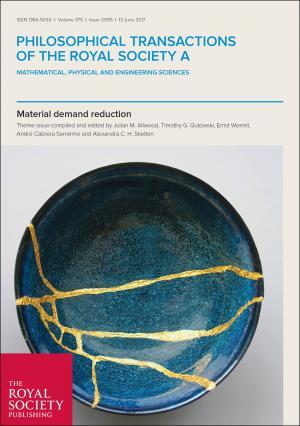
Submitted by D.J. Goode on Fri, 05/05/2017 - 08:23
The Starbridge Lecturer in Theology and Natural Sciences, Dr Andrew Davison, has contributed to the latest edition of the Philosophical Transactions of the Royal Society A: Mathematical, Physical and Engineering Sciences. Although theologians were prominent among the founders of the Royal Society, we think Dr Davison’s paper must be the first time that a theologian has been published in this journal for many years. His article appears as part of a themed interdisciplinary issue on ‘material demand reduction’. The issue responds to work finding that a necessary and important part of mitigating climate change would need to involve producing, and discarding, fewer material objects.
Dr Davison’s article is entitled ‘“Not to escape the world but to join it”: Responding to Climate Change with Imagination not Fantasy’. In it, he turns to the human faculty of imagination to discuss approaches to climate change, and towards material demand reduction more specifically. He draws upon the distinction between imagination and fantasy, found in Samuel Taylor Coleridge and Iris Murdoch, to analyse attitudes to climate mitigation, not only among those who deny the reality of the problem, but also among those who acknowledge it, but then defer an active response to the future out of ‘techno-optimist’ expectations of a solution. We will only make the necessary changes to human patterns of life, he suggests, when the message about potentially catastrophic climate change enters our imagination, in the full sense of what philosophers have meant by that term. It will not simply involve responding to a threat with aversion, but also being attracted by what an alternative vision of human life has to offer, not least in terms of new patterns of making and repair.
Summary of the Paper
The work of climate scientists, demonstrating human-driven climate change, has not provoked the widespread and far-reaching changes to human behaviour necessary to avert potentially catastrophic environmental trajectories. This work has not yet sufficiently been able to engage the individual and collective imagination. Drawing on Samuel Taylor Coleridge (1772–1834) and Iris Murdoch (1919– 1999), we can distinguish two modes under which the human imagination can operate: in Murdoch’s terms, these are ‘imagination’ and ‘fantasy’. To relate imaginatively is to be willing to allow one’s internal image of the world to be changed by what one encounters, while an outlook characterized by fantasy relates to the world as one would wish it were, rather than how it actually is. Fantasy, therefore, operates not only among those who deny climate change, but also among those who entertain the promise of a technological solution too optimistically. An imaginative outlook, by contrast, evaluates actions and patterns of behaviour in terms of their relation to a wider whole. This is necessary for providing the degree of agency required to step out of a cycle of ever accelerating production, which is explored in terms of an analogy to a discussion of revenge and forgiveness from Hannah Arendt (1906–1975). Ultimately, the need to engage the imagination is an opportunity as well as a challenge. To live imaginatively is fulfilling, and that is precisely what the challenges of climate change require.
